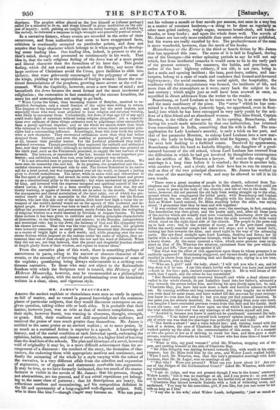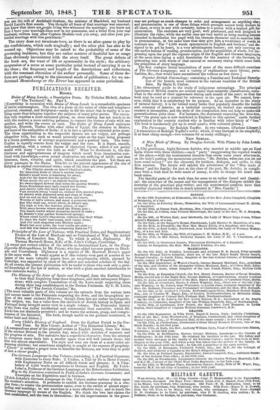MR. JAMES'S BEAUCHAMP.
AMONG the ancient sophists or rhetoricians were men so ready in speech, so full of matter, and so versed in general knowledge and the common- places of particular subjects, that they would discourse extempore on any given question, taking either side or both sides. It is probable that their matter, however just, was as trite as that of modern compilations, and their style, however fluent, was wanting in closeness, thought, strength, or grace. Still, their readiness and skill surprised their auditors, and received the praise of men much greater than themselves. Mr. James is entitled to the same praise as an ancient sophist ; or to more praise, by as much as a sustained fiction is superior to a speech. A knowledge of history, and of the social condition at each historical epoch, embracing the opinions, habits, manners, and classes of society, is a higher kind of learning than the dead lore of the schools. The plan and structure of a novel, however void of originality it may be, is a more difficult achievement than the ar- rangement of a discourse : the conduct of the story, the formation of cha- racters, the endowing them with appropriate motives and sentiments, and finally the animating of the whole by a style varying with the colour of the narrative, is a very different affair from the selection and expression of arguments, or of appeals and statements resolvable into arguments. It may be true, as we have formerly intimated, thac too much of the manu- facturer is visible in the novels of Mr. James; that his persons, though not abstractions, are too general, and if not actual repetitions yet belong- ing to the same class of patterns ; that hit descriptions are heavy, his reflections needless and encumbering, ami his composition deficient in the life and spontaneity of a long-cogitated well-digested subject. Still, who is there like him P—though Camper may become so. Who can pour out his volume a month or four novels per annum, not once in a way but as a matter of constant business,—a thing to be done as regularly as other men grind cutlery, weigh sugar, measure broad-cloth, sell knick- knacks, or keep books ; and upon the whole done well. The novels of Mr. James are not only more readable than most others that are published, but his wares are really excelled by few. The productiveness of the man is more wonderful, however, than the merit of his books.
Beauchamp or the Error is the third or fourth fiction by Mr. James that has appeared this year. The scene of it is laid in England, during one of the Georges—the writer spinning periods to say he will not say which, but from incidental remarks it would seem to be in the early part of the present century. The manners, the habits, and practices, are rather of the last : highway robbery, if not rife, is not rare, being in fact a main and opening incident ; the inns, post-boys, ostlers, and inn- keepers, belong to a state of roads and roadsters that formed and favoured highwaymen ; the social customs, the social spirit, the hospitality, the readiness with which acquaintance was formed, the incidents of life, and more than all the atmosphere as it were, carry back the subject to the last century ; which might jest as well have been avowed at once, as mystified in direct addresses from the writer to the reader. Beauchamp, or Lord Lenham as he turns out to be, is at once the hero and the main machinery of the piece. The " error " which he has cora- mitted is a Scotch marriage, (scarcely legal, we apprehend, even in Scot- land,) into which he has been entrapped in very early youth by the arti- fices of a false friend and an abandoned woman. This false friend, Captain Moreton, is the villain of the novel. At its opening, Beauchamp, after having his youth made miserable by that one indiscretion, has returned from concealment in India, conceiving that his wife is dead. The non- application for Lady Lenham's annuity, is only a trick on her part, and that of her paramour Moreton, to entrap Lord Lenham into a new mar- riage ; the Lady to bring him to public trial for bigamy, the Captain as his next heir looking to a forfeited estate. Deceived by appearances, Beauchamp offers his hand to Isabella Slingsby, the daughter of a good- natured baronet of the old school, whom Lord Lenham has rescued from the difficulties in which he had got involved by thoughtless extravagance and the artifices of Mr. Wharton a lawyer. Of course the stage of this marriage is a long time before it is reached ; for there is another lady, with another lover, and a rival; and their love has to run its course as well as that of the two principal characters. Mr. James has worked up the scene of the marriage very well, and may be allowed to tell it in his own words.
"There were a great number of people in the church, collected from Tar- ningham and the neighbourhood; some in the little gallery, where they could see best; some in pews in the body of the church; and one or two in the aisle. The latter, however, did not prevent the old lady from seeing straight up to the altar, around whioh was congregated the bridal party, with Beauchamp and Captain Hayward on the one side and Sir John Slingsby with his family on the other. Just as Widow Lamb entered, Dr. Miles standing before the altar, was saying aloud, I pronounce that they be man and wife together.' "It was evident the ceremony was nearly over; the marriage, in fact, complete. The benediction was then given, and the psalm said; and, after all those parts of the service which are usually read were concluded, Beauchamp drew the arm of Isabella through his own, and led her down the aisle towards the little vestry which stood on the right-band side of the church. The people in the pews rose up to look over; but, to the surprise of many, one of the pew-doors opened, before the newly-married couple had taken two steps; and a lady issued forth, turning her face towards the altar, and stood right in the way of the advancing party. Her eye fixed straight upon Lord Lenham, flashing and fierce; her lip curled with a smile of contemptuous triumph, while her brow appeared knit with a heavy frown. At the same moment a voice, which some persons near recog- nized as that of Mr. Wharton the attorney, exclaimed from the pew which the lady had just left, Now she has spoiled it all.' "But what was the effect of this apparition upon those in whose presence it so suddenly appeared? Beauchamp staggered, and turned deadly pale; and Isabella recoiled in alarm from that menacing look and fkehing eye, saying in a low tone, Good Heaven, who is this?'
"'Who am I, girl?' said the lady, aloud: I will tell you who I am, and let him deny it if he can. I am this man's lawful wife whom you have just married —Look at his face: pale, dastard conscience is upon it. Ile is well aware of the truth that I speak, and the crime he has committed.'
"But Beauchamp instantly recovered himself; and while a dead silence pre- vailed in the whole church, he put Isabella's hand into her father's, advanced a step towards the person before him, and fixing his eyes firmly upon her, he said, Charlotte Hay, you have laid once more a dark and horrible scheme to injure me. By cunning artifices and long concealment, you have taught me to believe you were dead for some years, and have waited till this moment for you revenge: you know it—you dare not deny it: but you may yet find yourself deceived. In one point you are already deceived; for, doubtless, judging from your own heart, you imagine I have concealed previous events from this lady and her family. Such is not the case; and now you force upon me that which I have always avoided, the trial whether there ever was any marriage at all between myself and you. "'Avoided it, because you knew it could not be questioned,' answered the lady, scornfully. Your father and yourself took lawyers' opinion enough; and the re- ply of every one was that the marriage was perfectly good and valid.' "'Not worth a straw I ' said a voice behind her; and, turning round with the look of a demon, the eyes of Charlotte Hay lighted on Widow Lamb, who had walked quietly up the aisle at the commencement of this scene. For a moment or two she gazed at her as if striving to recall her face and then gave a short scream, muttering afterwards to herself, I know who has done this—I know who has done this l' "'What is this, my good woman?' cried Mr. Wharton, stepping out of the pew' and putting himself at the side of Charlotte Hay. "Sir John Slingsby was darting forward towards him, with wrath in his coun- tenance; but Dr. Miles held him by the arm and Widow Lamb replied boldly, What I said, Mr. Wharton, was, that this lady's pretended marriage with Lord Lenham, then Mr. St. Leger, was no marriage at all.' " ' But why? Were you present? What can you know about it? Are you one of the Judges of the Ecclesiastical Court?' asked Mr. Wharton, with amaz- ing, volubility. I am no judge, and was not present though I was in the house,' answered Widow Lamb; ' but it was no mamage at all, and I can prove it: so you need not be terrified, dear young lady, for you are his lawful wife at this very moment:, "Charlotte Hay turned towards Isabella with a look of withering scorn, and exclaimed, You may be his concubine, girl, if you like, but you can never be his wife as long as I live: "'I say she is his wife,' cried Widow Lamb, indignantly, 'just as much as you are the wife of Archibald Graham, the minister of Blackford, my husband David Lamb's first cousin. You thought all trace of that marriage was removed: you knew that there iire.,people living who witnessed the marriage; from knew not that I have your marriage-lines now in my possession, and a letter from your real husband, written long after Captain Moreton took you away, and after your pre- tended marriage with this gentleman."
The story does not terminate here, as there is an after-game to play by the confederates, which ends tragically; and the other plot has also to be wound up. Objections may be raised to the probability of some of the governing incidents, but they are rather matters of doubtful law or usage than obviously inconsistent with the story itself. The great defects of the book are, the want of life or spontaneity in the style ; the arbitrary suspension of a scene at some particular point instead of carrying it on to the close ; the frequency and length of the descriptions and reflections, with the constant obtrusion of the author personally. Some of these de- fects are perhaps owing to the piecemeal mode of publication; for we un- derstand Beauchamp or the Error has appeared in some periodical.



























 Previous page
Previous page